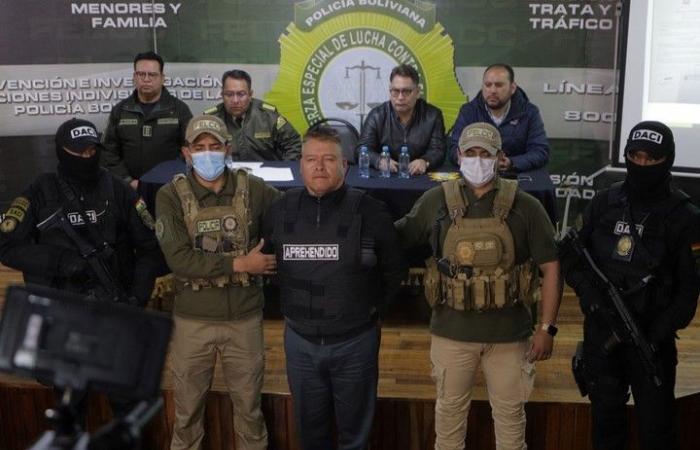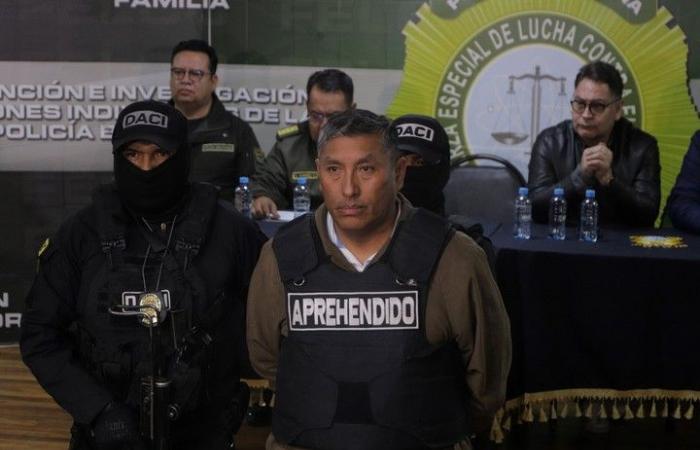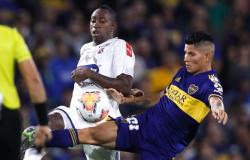It was perhaps one of the most dramatic moments of the attempted Coup d’état in Bolivia. The face to face between President Luis Arce and General Juan José Zúñiga in a hallway of the Palacio Quemado, in La Paz, continues to cause people to talk and now a new video has appeared that shows in detail what it was like in the dramatic moment in which the ruler faces the riot in person.
Guarded by a group of officials, among whom you can see his Minister of Government, Eduardo del Castillo, protagonist of one of the videos of the Coup attempt when he shouted at a soldier in an armored vehicle, and the Minister of the Presidency, María Nela Prada, Arce faces the three heads of the Armed Forces, with Zúñiga at the head.
“We are upset,” the soldier tells him.
─We are upset by this attitude, do you see this? ─Arce stops him and shows him the presidential baton, amid shouts, restrained pushing and with tension in the air, with the army deployed taking the square in front of the Government House.
“Here is the commander of the Air Force,” Zúñiga points out, wearing a bulletproof vest to a soldier on his left, also in combat clothing.
Immediately the screams take over the scene.
“Here’s your captain!” someone shouts behind Arce. “We can’t go back!” another person shouts. Suddenly, the person standing next to the President asks for calm with a gesture, while Arce stood firm, looking Zúñiga in the eyes, with the motley presidential baton in his hands.
─Obey my order captain, go back and withdraw all the military police to their barracks at this moment! ─Arce raised his voice.
“It can’t be that, it can’t be contempt, so much contempt,” complained Zúñiga, who never stopped chewing gum.
“I cannot forgive what you are doing against the Bolivian people,” Arce responded firmly.
“Against democracy!”, loudly recriminates Minister María Nela Prada, one of the first to be recorded in the Quemado Palace denouncing the coup attempt on social media. “Long live damn democracy!” launched another of Arce’s followers in the midst of the commotion.
─If you respect the military command and consider yourself a good soldier, withdraw all those forces. It’s an order. Are you not going to listen to me? ─Arce challenged him.
“No,” Zúñiga blurted out. Barely two letters were enough to summarize his insurrection.
“You are not alone President!”
“We are not in times of dictatorships.”
“The people come first.”
Everything was screaming at that point.
The atmosphere was heating up as the militants did not give up their attitude or retreat from Arce’s firmness. Zúñiga remained stoic, chewing gum in an overacting, almost nervous manner, while the generals next to him hesitated.
Suddenly Arce and his Government Minister targeted the head of the Air Force.
─Are you involved in this? ─President Arce questions him, who shows him his command staff again shouting “do you know what this is?”
“The three commanders are…” Zúñiga tries to defend him, realizing that the entire leadership supported his decision to take power by force.
“Don’t get involved,” Minister Del Castillo stops him abruptly.
“It’s the command staff,” the head of the Air Force answers almost nervously.
In the background you can see how Zúñiga at that moment turns around and decides to leave the Quemado Palace in the face of the intransigence of Luis Arce and his cabinet that guarded him.
The anatomy of that moment that will be recorded in the history of Bolivia is completed with more screams. “It’s your captain, general!” someone says. “The people are going to judge you,” another person rebukes him. “This is not going to last,” says a third, while the leader of the Coup attempt leaves the place.
Two soldiers were arrested for the coup attempt
Bolivian forces arrested two military leaders on Wednesday for an attempted coup against President Luis Arce, shortly after rebellious soldiers besieged the government headquarters for hours and tried to break down one of its doors.
After a frantic day, General Juan José Zúñiga was arrested outside a military barracks in La Paz and taken to a police vehicle on charges of terrorism and armed uprising, according to the prosecutor’s office.
“He is detained, my general!” said the Vice Minister of Government (Interior), Jhonny Aguilera, according to images from state television.
Hours later, the Minister of Government (Interior), Eduardo del Castillo, reported the arrest of the head of the Bolivian Navy (Navy), Juan Arnez Salvador, as the other person responsible.
Zúñiga was at the head of the uniformed men who tried to break into the presidential palace, in the center of La Paz. His men used tear gas against people who tried to approach the building.
The officer entered walking through the same door that tried to knock down one of the battle tanks. Shortly afterward he left by the same means.
“We are in an attempted coup d’état by soldiers who are staining the uniform,” Arce said when taking the oath of office to a new leadership of the Armed Forces in the palace that at that time was surrounded by Zúñiga’s troops.
After his withdrawal, the president went out to a balcony to address hundreds of followers: “No one can take away the democracy that we have won (…). We are sure: we are going to continue and we are going to continue working.”
Both the government and former president Evo Morales, a former ally and now political rival of Arce, had called for mobilizations in the face of the military uprising.
On his social networks, the former Bolivian president suspended the call after “calm had been restored at the headquarters of government.”







